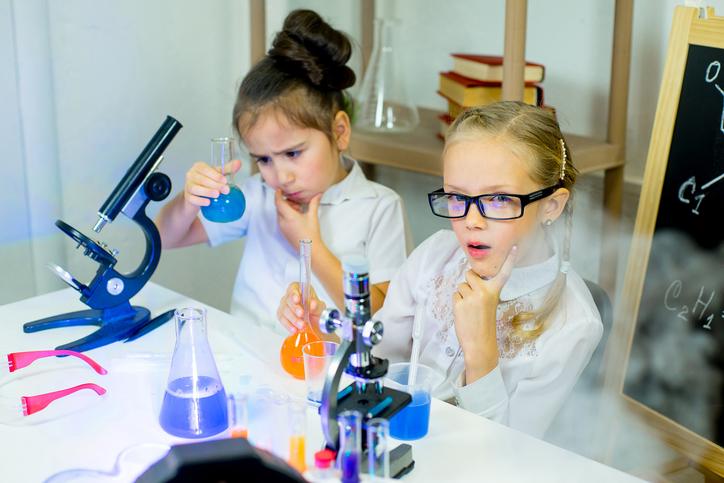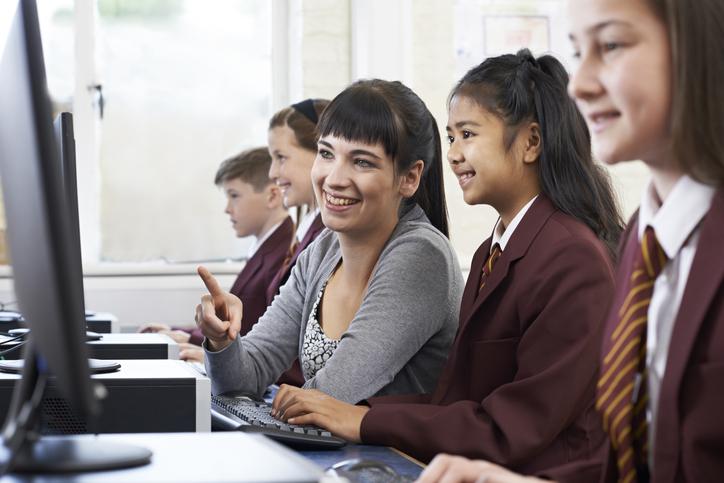
How a school exchange with my daughter led me to question the role of universities

I first went to university aged seven. It was unusual in the 1970s for women raising children to study at university. After she dropped my sister and me off at “the creche”, my mother went to her classes, and that’s how we got through, as a family. It was in those endless holiday breaks that I came to love libraries, laboratories and lecture halls. Raising her career prospects while raising children was surely a struggle, but for me as a child, it all seemed natural and effortless. Why would I not be where my mother was?
“The crèche” soon found its place alongside “Dinosaur World” and “Butlin’s” as a symbol of joy, anticipation and excitement. Of course, the adults looking after us were no more than bachelor’s students themselves, and probably volunteers. They creatively filled our days with nature trails around the campus, softball in the gymnasium and “research” in the library with crayons and teletype printout paper, striped with thin green lines and holes along the edges. It is there I came to love, and belong in, the university.
- Want to be a better teacher? My daughter showed me we need to play more
- How to embed service to society within the educational experience
- Seven strategies to turn academic libraries into social organisations
These memories flooded back recently. I had agreed a school exchange with my daughter. Two weeks previously I’d been asked to give a lesson at her primary school for “Science Week”. The headteacher’s invitation to all parents who are scientists was irresistible. Teaching “the physics of sound” to eight-year-olds requires flying balloons, Swanee whistles, whoopee cushions, tubes, bicycle horns, water and small quantities of explosives.
I was, of course, a tourist. After my hour as a glorified children’s entertainer, popping, farting, splashing and honking my way into the hearts (and hopefully memories) of 60 excited kids, I was exhausted, harbouring no illusions about the difficult reality for primary school teachers for whom this is “the day job”.
I saw it coming. My girl, both proud and a little bewildered that “my dad is a professor who came to our school”, soon uttered the words: “Daddy, can I come to your school now?” Inset days, randomly inflicted on working parents, soon provided the opportunity. The next day off we tramped off with a great bag of toys, hand in hand.
The bag of toys went unopened. From the moment of arrival she was enfolded by an entourage of excited cybersecurity students who spun her around in wheelie chairs, gave her network cables for a skipping rope and surrendered their phones to play games on. They got into intense conversations about whether Ewoks are baby Wookies and why Mandalorians never remove their helmets.
But this is no schmaltzy tale about how cute my kid was at work. For me, it raises very serious questions about childcare, education and how our schools and universities fit into society. Both experiences, of visiting my daughter’s school and having her come to my classes, felt immensely positive and worthy of deeper examination.
It makes me wonder why we make such a deal of fracturing education into primary, secondary and tertiary levels. Why, in 2023, as we face post-industrialisation, must we partition not just knowledge but socialisation into a long and lonely ladder to climb? Education includes fostering those universal bonds that make us all part of the village that raises a child. Our daily retreat into specialised workhouses is starting to feel Victorian.
Other places I’ve seen such fluidity are Finland and Norway, cultures at ease with parental involvement. In Britain we bully and fine parents, while Ofsted strikes fear into the hearts of any teachers who dare to think outside the box.
A perennial conversation I have with women in tech concerns childcare. Access to education for more mature women transitioning into cyber, healthcare or other areas in which we face worrying national shortfalls, is about more than money. It’s still about the friction between motherhood and self-development, which seems shameful in 2023.
Universities, certainly, must update their role. That means shaking off corporate pretensions and returning to a place at the centre of society as a civic, responsible, public good.
My students are not all young things. Many, in their thirties, don’t expect to have kids, because even with a degree they will never own a house in the UK. They are resigned to labouring under an ideology that pushes corporate values into the family, rather than the other way around. Instead, we should do more to retake institutional and corporate spaces as extensions of our home and family lives.
Meanwhile, university ceased to be a last, fun rite of passage before middle-class security. Once filled with politics, protest and drinking at the student union bar, the experience is now a corporate slog, minus the pay.
For those trapped between childhood and maturity, it’s become a holding pen, a cactus land; barren, sterile, rigid and disconnected from any wider social context that offers meaning.
So, reimagine everything from Level-7 assignments to primary school “homework” as part of a new social continuum spanning generations. If AI is to make the very conceit of “work” irrelevant, then adults and children creating more space in their worlds for each other seems a natural adjustment.
I am demanding nothing less than a revolution in the civic responsibilities of universities.
A new social contract for higher education institutions will include strengthening their connection not to local “business” but to local interests in general – to common institutions, to schools, to the community, to churches, hospitals and civil services like firefighting, policing and volunteer groups.
They will no longer be allowed to stand alone as outposts of corporate interests. The impact of research and teaching must be assessed according to its practical and demonstrable value to those who live and work within the immediate community. The weight of impact favouring “industry” will be dialled down in a rehumanised university system.
No woman, for example, should have to leave education because a new life is coming into the world. Universities will provide crèches and other childcare services and, crucially, these will be free.
Local communities deserve a huge boost as stakeholders. Every university town should have a bigger say in what research is done, and what is taught, including powers of veto to curb unethical and extractive academic practices that do not benefit everyday family life.
Or, perhaps put more simply: universities could benefit from having eight-year-olds asking questions in the lecture halls as much as schools do from having dads give a class on fart noises.
Andy Farnell is a British computer scientist specialising in signals and systems. He is a prolific speaker, visiting professor and consultant and is currently teaching cybersecurity while writing a new book titled Ethics for Hackers and producing a new online show.
If you would like advice and insight from academics and university staff delivered direct to your inbox each week, sign up for the THE Campus newsletter.


